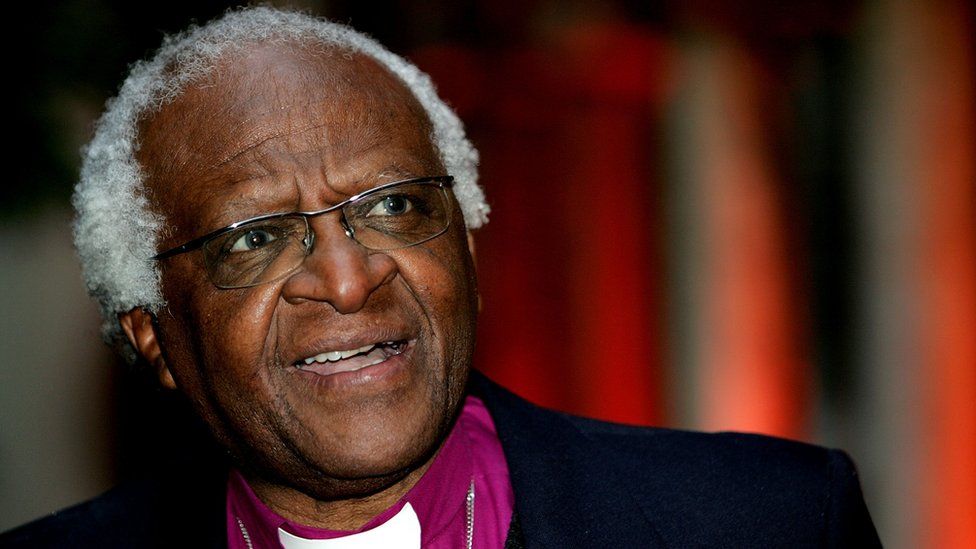
Desmond Tutu was 'committed human rights leader' - Akufo-Addo
Enoch Darfah Frimpong
Politics
3 minutes read
President Nana Addo Dankwa Akufo-Addo says Archbishop Desmond Tutu, the Nobel Peace prize laureate who helped end apartheid in South Africa, "run his race set before him, and leaves behind indelible footprints in the sands of time."
Eulogizing Archbishop Desmond Tutu who died at the age of 90 at the weekend, President Akufo-Addo said he was a "redoubtable priest, arguably the greatest religious leader of his generation, renowned freedom fighter, fearless anti-apartheid activist, committed human rights leader, iconic Nobel Peace Prize winner, he fulfilled his life's purpose on earth, and receives the plaudits of a grateful posterity.
On behalf of the people and Government of the Republic of Ghana, I extend our deepest condolences to President Matemela Cyril Ramaphosa, the people and Govenment of the Republic of South Africa and his family on the death of one of Africa's most noble, patriotic sons, Archbishop Desmond Mpilo Tutu.Redoubtable priest, arguably the greatest religious leader of his generation, renowned freedom fighter, fearless anti-apartheid activist, committed human rights leader, iconic Nobel Peace Prize winner, he fulfilled his life's purpose on earth, and receives the plaudits of a grateful posterity.The history of Africa's struggle for freedom from colonialism, imperialism and the racist ideology of apartheid has been immeasurably enriched by the contribution of this jovial, dedicated and principled defender of the liberties and rights of Africans and oppressed peoples of the world.His work as chairperson of the historic Truth and Reconciliation Commission of South Africa, established by his outstanding compatriot, contemporary and friend, Madiba, President Nelson Mandela, the 1st President of democratic South Africa, was instrumental in promoting reconciliation amongst the peoples of South Africa in the post - apartheid era, which enabled a united South Africa to emerge from the debris of apartheid, much to the astonishment of many in South Africa and around the world.The Commission provided an example which was followed elsewhere in several countries in Africa, where systematic violations of human rights had at a given moment become part of their political culture, including in our own Ghana.He run his race set before him, and leaves behind indelible footprints in the sands of time.May his soul rest in perfect peace in the bosom of the Almighty, until the Last Day of the Resurrection when we shall all meet again. Amen!
South African President, Cyril Ramaphosa announcing Arhbishop Tutu's passing on Sunday [Dec 26, 2021] said the churchman's death marked "another chapter of bereavement in our nation's farewell to a generation of outstanding South Africans".
He said Archbishop Tutu had helped bequeath "a liberated South Africa".
Related: South Africa’s Desmond Tutu dies at 90
Tutu was one of the country's best known figures at home and abroad.
A contemporary of anti-apartheid icon Nelson Mandela, he was was one of the driving forces behind the movement to end the policy of racial segregation and discrimination enforced by the white minority government against the black majority in South Africa from 1948 until 1991.
He was awarded the Nobel prize in 1984 for his role in the struggle to abolish the apartheid system.
Tutu's death comes just weeks after that of South Africa's last apartheid-era president, FW de Clerk, who died at the age of 85.
President Ramaphosa said Tutu was "an iconic spiritual leader, anti-apartheid activist and global human rights campaigner".
He described him as "a patriot without equal; a leader of principle and pragmatism who gave meaning to the biblical insight that faith without works is dead.
"A man of extraordinary intellect, integrity and invincibility against the forces of apartheid, he was also tender and vulnerable in his compassion for those who had suffered oppression, injustice and violence under apartheid, and oppressed and downtrodden people around the world."
Tutu was one of the country's best known figures at home and abroad.
A contemporary of anti-apartheid icon Nelson Mandela, he was was one of the driving forces behind the movement to end the policy of racial segregation and discrimination enforced by the white minority government against the black majority in South Africa from 1948 until 1991.
He was awarded the Nobel prize in 1984 for his role in the struggle to abolish the apartheid system.
Tutu's death comes just weeks after that of South Africa's last apartheid-era president, FW de Clerk, who died at the age of 85.
President Ramaphosa said Tutu was "an iconic spiritual leader, anti-apartheid activist and global human rights campaigner".
He described him as "a patriot without equal; a leader of principle and pragmatism who gave meaning to the biblical insight that faith without works is dead.
"A man of extraordinary intellect, integrity and invincibility against the forces of apartheid, he was also tender and vulnerable in his compassion for those who had suffered oppression, injustice and violence under apartheid, and oppressed and downtrodden people around the world."
